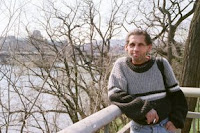
Letter from Prague
April 13, 2007
His name is Alin. I’ll likely never know much more than that about him.
I had come to Prague on holiday, initially without much thought of seeing how the other side lives in that beautiful city. But having heard news of a refitted barge Prague was testing as a shelter for homeless people, I grew curious to see it for myself during my visit to the city last week.
My partner and I first spotted the barge while on a boat tour along the Vltava River, which winds through the centre of Prague.
It matched the photo from an on-line Czech story about the project that I’d asked our bemused hotel clerk to print out for me, and bore the same name: Hermes. Docked in the river below a massive metronome the city had installed to replace a statue of Stalin, I figured the barge wouldn’t be too hard to find again on foot.
The big ship had something of a foreboding look to it when I made my way there a couple days later, as did the man on deck who gestured at me to leave as I made my way down the gangplank. I retreated to the street, eventually spotting Alin as he approached the barge.
Wearing the demeanor and the faded tattoos of someone who’d had a hard life, he seemed like the kind of fellow who might know a thing or two about a barge for the homeless. Neither of us could speak each other’s language, but we managed to settle into something of a conversation.
I pointed to the barge and asked if he slept there. Yes, but he didn’t want the man who had scared me off to see that I was talking to him. Yes, he’d be happy to pose for a picture, but not here. We walked out of sight of the man who Alin nervously called the “chef.”
I asked Alin how many people slept aboard the barge, counting on my fingers to convey my meaning. He pulled out an alarm clock from his backpack and slowly pointed to one number and then another: 68.
I learned later that the barge can actually hold 250 men and women. It opened as a shelter in February, after city council spent the equivalent of $1.3 million to refit the ship, which once travelled the waters between Prague and Hamburg.
People like Alin can sleep there for 20 korunas a night - about $1. On a balmy spring night, with a vast park just a couple staircases away across the street, maybe that fee gets in the way of a full house.
Or maybe it has more to do with the non-stop clatter of the high-speed motorway running alongside the river where the Hermes docks, or the pounding jackhammers from the bridge being renovated directly above. Alin shrugs, and I take his meaning: Nothing wrong with a bed on the barge, but nothing particularly right about it, either.
In Prague, some 6,000 to 10,000 people live homeless, left behind these past 18 years during the city’s massive post-Communist transformation.
Unlike Victoria, Prague still has some bad parts of town where it can hide its growing number of lost souls, out of sight of the international tourists who now flood its vibrant streets by the thousands. Had I not gone looking for the barge, the only visible evidence of social ills would have been a handful of prostrate beggars in the city’s Old Town and the occasional staggering, stumbling street drunk outside a Metro station.
But flourishing economies in cities like Prague, Berlin and London are fuelling the same kind of phenomenal real-estate growth that our region has seen. With even the slummiest of neighbourhoods now facing development pressures, homelessness won’t be invisible anywhere for much longer. Europe alone has more than 2.7 million people living homeless.
Alin and I could talk of none of this, of course. Enthusiastic gestures and pointing only get you so far. So once we’d walked far enough to avoid being seen by the man on the barge, Alin cheerfully posed for a picture, then scratched his palm in a last gesture that I clearly understood: Money, please.
I dug out some korunas, the equivalent of $10 or so. In exchange, he loaded me up with goods from his backpack - stolen, I suppose - that he indicated were for my children and husband.
An electronic sudoku game. A package of modelling clay. A wooden bird with a broken tail. A child’s jacket. A whiskey flask, whisper of spirits still intact. The broken alarm clock he and I had employed in our communications. I resisted all of it, but saw quickly that he interpreted my refusal as an insult.
My own backpack now bulging, we said our goodbyes, and I headed back to the shops at the heart of the city. Alin’s gifts in my pack triggered the anti-shoplifting devices in every store I tried to go in.
An apologetic young Czech security guard at the Bata store finally asked to empty my bag, then repacked it without a word and sent me on my way.
No comments:
Post a Comment